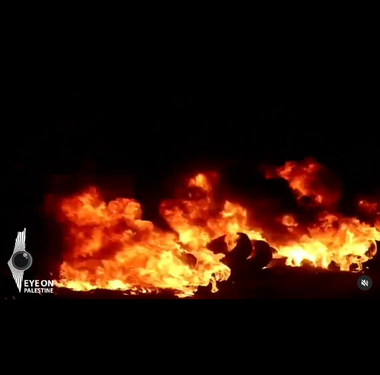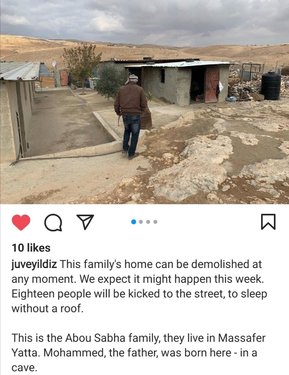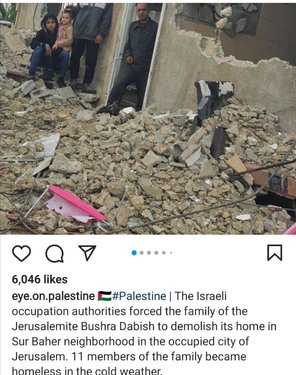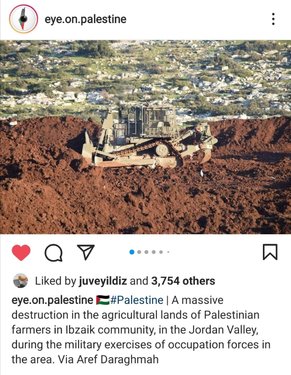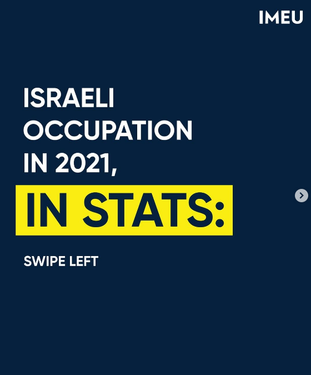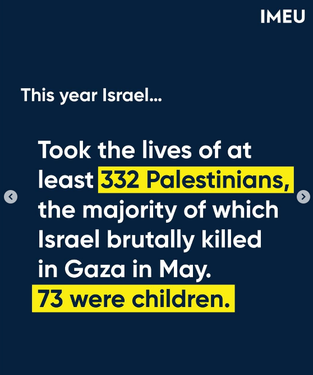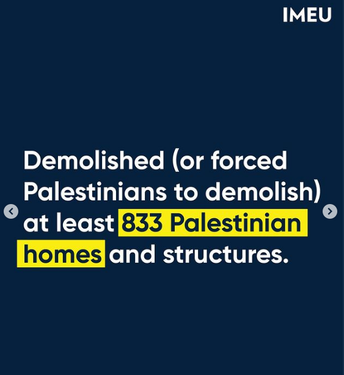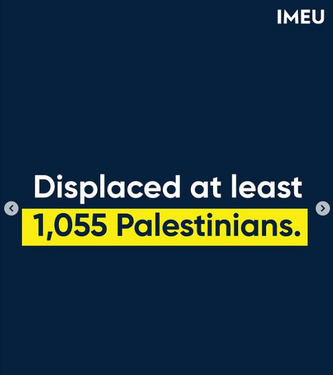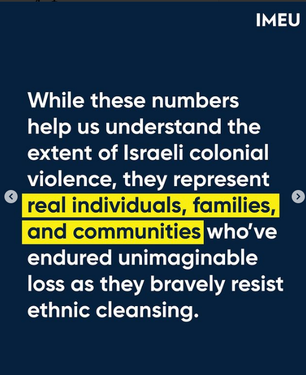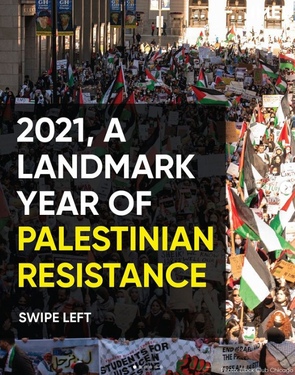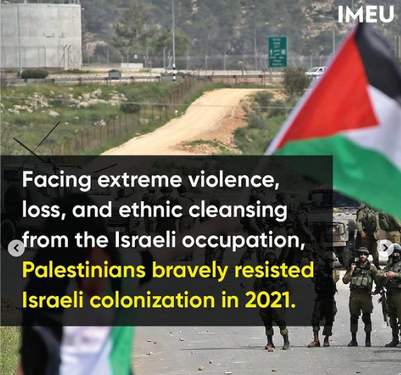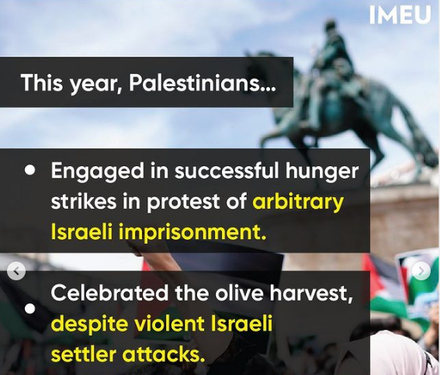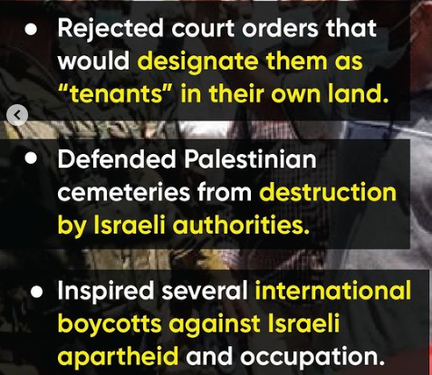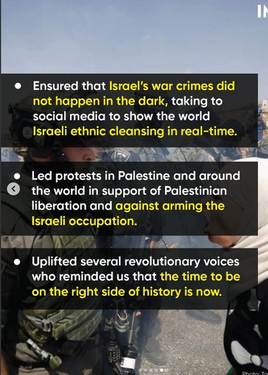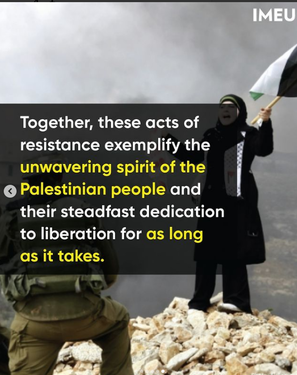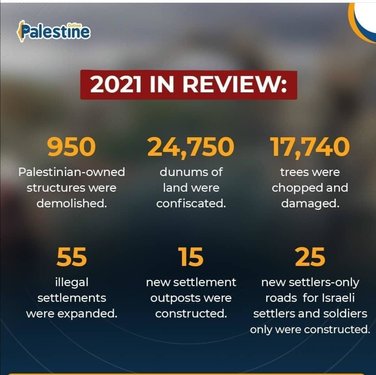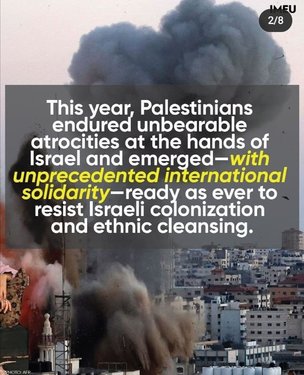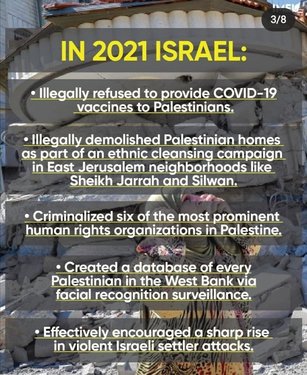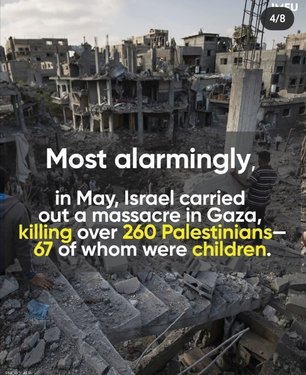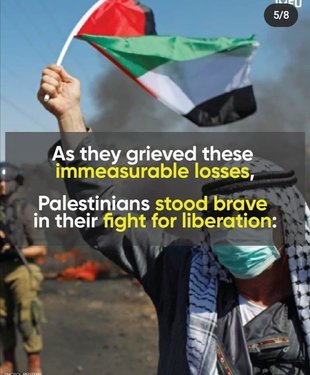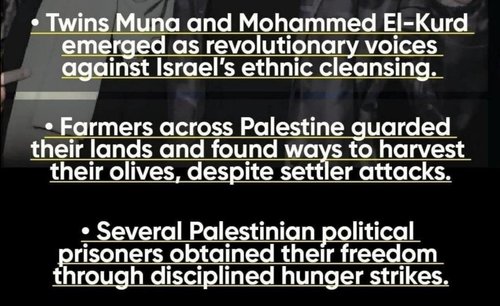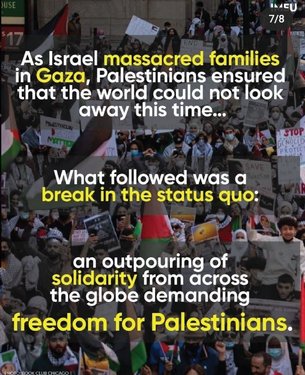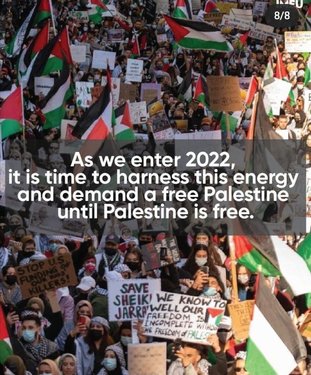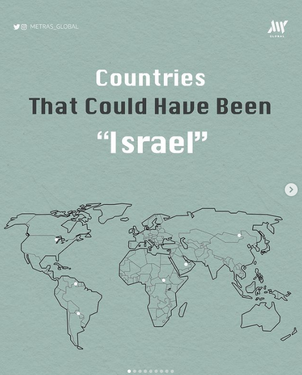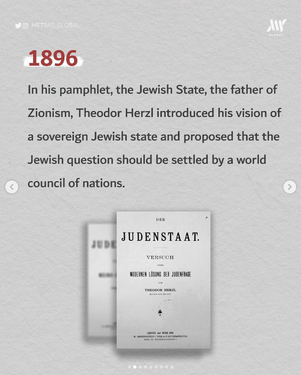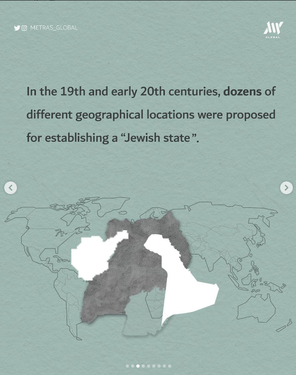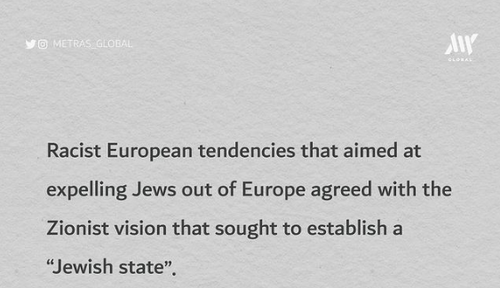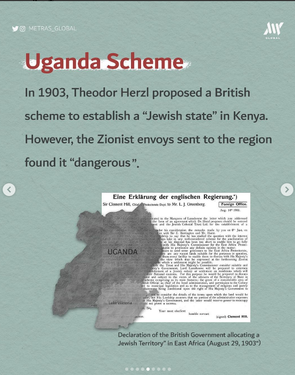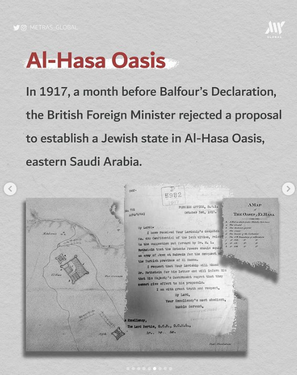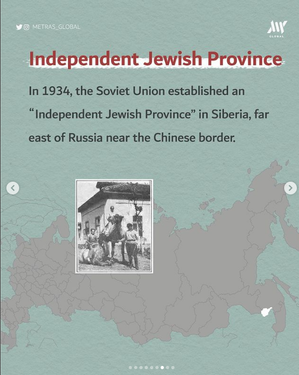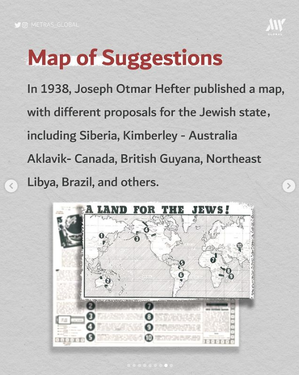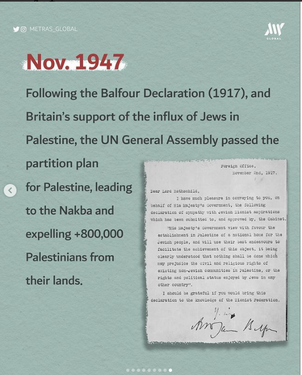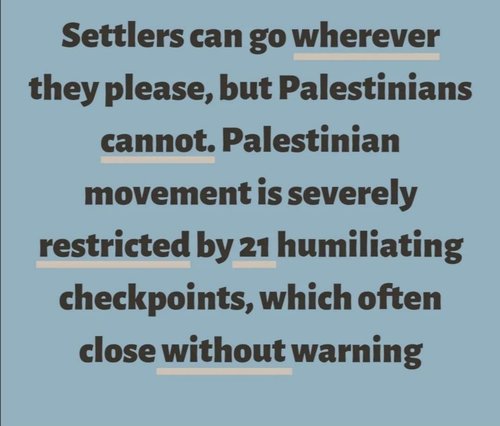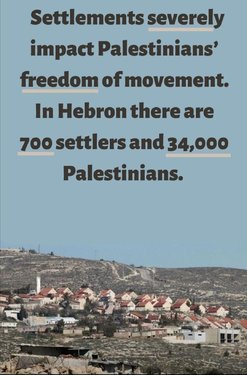-
Posts
8,465 -
Joined
-
Days Won
773
Content Type
Profiles
Forums
Events
Everything posted by ummtaalib
-
Above information from DCIP Defense for Children International - Palestine (DCIP) is an independent, local Palestinian child rights organization dedicated to defending and promoting the rights of children living in the West Bank, including East Jerusalem, and the Gaza Strip.
-
Children used as Human Shields International humanitarian law explicitly prohibits parties to a conflict from directing "the movement of the civilian population or individual civilians in order to attempt to shield military objects from attacks or to shield military operations." An October 2005 ruling of the Israeli High Court of Justice also prohibits the practice. Despite this, DCIP has documented numerous cases where Israeli forces have used Palestinian children as human shields during ground operations. In 2014, a 16-year-old Palestinian boy was forced at gunpoint to search tunnels in the Gaza Strip for five days during Operation Protective Edge. During this time, he was interrogated, verbally and physically assaulted, and deprived of food and sleep. At least seven children between nine and 17 years old were used as human shields by Israeli forces in the Gaza Strip during the Israeli military offensive known as Operation Cast Lead in December 2008 and January 2009. Palestinian Children recruited as Informants The primary manner in which Israeli forces seek to recruit Palestinian children is as informants, usually during interrogations. Informants are recruited to monitor and disclose information to Israeli authorities about the activities of people living in their community. This can include providing the names of children who have thrown stones. Attempts to recruit often involve the use of threats and inducements, such as revoking a family member's work permit or a financial reward or even early release, in exchange for information. In addition to violating international laws, such attempts violate Israeli law. Due to the sensitive nature of this issue within Palestinian society, the scale of the problem is unclear, as both children and adults may refuse to discuss the matter, fearing ostracization or punishment by their communities.
-
Military Detentions Palestinian children in the occupied West Bank, like adults, face arrest, prosecution, and imprisonment under an Israeli military detention system that denies them basic rights. Since 1967, Israel has operated two separate legal systems in the same territory. In the occupied West Bank, Israeli settlers are subject to the civilian and criminal legal system whereas Palestinians live under military law. Israel applies civilian criminal law to Palestinian children in East Jerusalem. No Israeli child comes into contact with the military courts. Israel has the dubious distinction of being the only country in the world that automatically and systematically prosecutes children in military courts that lack fundamental fair trial rights and protections. Israel prosecutes between 500 and 700 Palestinian children in military courts each year. Since 2000, Israeli military authorities have detained, interrogated, prosecuted, and imprisoned approximately 13,000 Palestinian children, according to estimates by DCIP. Ill-treatment in the Israeli military detention system remains “widespread, systematic, and institutionalized throughout the process,” according to the UN Children’s Fund (UNICEF) report Children in Israeli Military Detention Observations and Recommendations. An average of 257 Palestinian children aged 12-17 years old were detained by Israeli authorities at any one time between 2014 and 2019, based on data released by the Israel Prison Service (IPS). During this period, an average of 48 young Palestinian children (12-15) were detained. Children typically arrive to interrogation bound, blindfolded, frightened, and sleep deprived. Children often give confessions after verbal abuse, threats, physical and psychological violence that in some cases amounts to torture. Israeli military law provides no right to legal counsel during interrogation, and Israeli military court judges seldom exclude confessions obtained by coercion or torture. A child is considered any person under 18 years, according to international norms. Between January 1, 2014 and December 31, 2019, DCIP collected sworn affidavits from 752 child detainees, describing their arrest, interrogation, and detention experiences. Of these, over half were arrested at night 87% were not informed of the reason for their arrest 95% had their hands and feet bound 84% were blindfolded 72% were subjected to physical violence 61% were subjected to verbal abuse, humiliation, or intimidation during or after their arrest 48% were transferred from the place of their arrest on the floor of a military vehicle 75% were strip searched 46% were denied food and water 32% were denied access to a toilet 70% were not properly informed of their rights 96% were interrogated without a family member present 52% were shown or made to sign a paper in Hebrew, a language most Palestinian children do not understand 35% were threatened or coerced 21% were subjected to stress positions 18% were detained in solitary confinement for interrogation purposes for a period of two or more days In 1991, Israel ratified the United Nations Convention on the Rights of the Child (CRC), which stipulates that children should only be deprived of their liberty as a measure of last resort, must not be unlawfully or arbitrarily detained, and must not be subjected to torture and other cruel, inhuman or degrading treatment or punishment. Despite various degrees of engagement by U.N. human rights bodies including the Committee on the Rights of the Child, the Committee Against Torture, the U.N. Working Group on Arbitrary Detention, as well as the Special Representative of the Secretary-General on Children in Armed Conflict, and numerous governmental and non-governmental organizations, Israeli authorities have persistently failed to implement practical changes to end its unlawful practices towards Palestinian child detainees. Reforms undertaken thus far have been largely cosmetic rather than substantive. Source
-
Child Fatalities & Injuries DCI-Palestine has been documenting Palestinian child fatalities and injuries at the hands of the Israeli military and settlers in the Occupied Palestinian Territory since September 2000 Fatalities In the West Bank, child fatalities generally occur in the context of military incursions, demonstrations against Israeli settlements or the separation barrier, or as a result of settler attacks against Palestinian children. In the Gaza Strip, the majority of child fatalities are the result of Israeli forces' attacks and full-scale military offensives, which cause a high number of civilian casualties. In recent years, Israeli forces have increasingly shot and killed Palestinian children with live fire near the Gaza border fence during mass demonstrations. Injuries Like fatalities, injuries in the West Bank occur as a result of military incursions, demonstrations, and settler violence. Injuries are frequently sustained when children are arrested, transferred, and detained in interrogation centers or prisons. In the Gaza Strip, injuries are most commonly the result of flying shrapnel produced by Israeli airstrikes or shooting at the border fence.
-
Disrupting Education In the West Bank, education is compulsory for children under 15. However, Israel’s network of military checkpoints impedes the movement of all Palestinians, meaning that otherwise short journeys can take several hours. For Palestinian children that must pass through Israeli military checkpoints to reach school, this results in missed class time, as well as subjecting children to violence, intimidation, and arbitrary arrest as children must interact with Israeli military personnel on their way to school. Palestinian children living near illegal Israeli settlements in the occupied West Bank report being subject to harassment and violence from Israeli soldiers and settlers as they travel to and from school. Settlers have also been known to attack schools with weapons and stone-throwing during the school day, creating an environment of fear at school that can impede the ability of children to learn and play.Israeli forces' attacks on schools and other education-related incidents, including attacks on educational personnel, threats of attacks, military use of schools, and other interferences with education, significantly impacted Palestinian children's right to access education. In 2019, the United Nations documented 257 education-related incidents in the occupied West Bank, including East Jerusalem, and the Gaza Strip that impacted children's right to access education. Repeated Israeli military offensives on the Gaza Strip have severely damaged its educational infrastructure, including through the targeting of United Nations-run schools. In the last major military offensive on Gaza in 2014, Operation Protective Edge, Israel damaged at least 232 schools and destroyed 29 others.Israel’s protracted closure of the Gaza Strip prevents essential materials for rebuilding damaged schools and constructing new facilities from entering the Gaza Strip, as well as learning materials. Fuel restrictions and poverty caused by the closure also prevent children from concentrating at school and some children drop out of school altogether as a result. Frequent power cuts force many Palestinian children in the Gaza Strip to complete their schoolwork by candlelight. Near-complete closure also prevents young people from leaving the Gaza Strip to study elsewhere, including children and young people who have acquired scholarships abroad. Access to Healthcare Palestinian children are denied access to health care and their right to health is negatively impacted due to Israeli closure policies, prolonged military occupation, and repeated military offensives. Palestinian children are unable to access sufficient healthcare in the Gaza Strip, including many children left permanently disabled and with long-term trauma following Israel’s repeated military offensives on the Gaza Strip. Israel’s closure of the Gaza Strip has plunged Gaza’s health sector into crisis. The closure restricts essential and lifesaving medical and pharmaceutical resources from entering the Gaza Strip as well as patients and companions leaving Gaza. Israeli authorities have maintained strict restrictions on travel to and from the Gaza Strip, as well as the import of vital materials, and the export of goods, blighting the economy. Egypt, too, has kept its crossing with the Gaza Strip in Rafah closed for the most part since 2013, opening it only intermittently. Repeated Israeli military offensives, including three particularly devastating ground and aerial assaults in 2008-2009, 2012, and 2014, devastated the Gaza Strip's infrastructure, including its healthcare system. This regular obliteration of Gaza’s infrastructure, combined with Israel’s closure policy, has created a human-made humanitarian crisis characterized by acute water and electricity shortages, further compromising the health of patients, who cannot expect treatment in sanitary conditions, or for vital and lifesaving electricity-powered machines to run without interruption. In 2018, when back-up generators failed at the Pediatric Specialized Hospital in Gaza City, medical teams had to manually ventilate four children until the machinery was fixed. Between Israel’s decade-long closure limiting the entry of pharmaceuticals, medical equipment, and specialized staff, and large-scale damage to medical infrastructure during Israel’s 2014 offensive, some treatments are now entirely unavailable in the Gaza Strip. Israeli closure policies prevent disabled Palestinian children from accessing resources that would enable them to live a full life, and traumatized children from accessing the psychosocial support they need to recover. Children who require medical treatment that cannot be provided within Gaza are frequently denied permits by Israeli authorities to leave Gaza. Palestinian children & Armed Conflict Palestinian children in the Gaza Strip are at risk of violence, including accidental violence, as a result of Palestinian armed group activities; and Israel’s ongoing blockade of the Gaza Strip has created an acute, human-made humanitarian crisis and deteriorating economic context within which children may be more vulnerable to recruitment, forced or voluntary, by armed groups. In January 2021, an explosion in the northern Gaza Strip destroyed a residential building, damaged several public buildings, and caused injury to 18 Palestinian children. The building owner’s adult son had built and maintained a warehouse on the roof used to store munitions and military equipment for the Palestinian armed group, Saraya Al-Quds, the military wing of Islamic Jihad, of which he was a member. Between January 2011 and September 2020, DCIP documented the deaths of nine children and the injury of two children who were involved with Palestinian armed groups. In several cases, the child fatalities that occurred within the context of activity by or involvement with Palestinian armed groups were accidental. On May 4, 2020, 17-year-old Adham Mahmoud Mohammad al-Masri, died after sustaining a gunshot wound to his chest while stationed at an Izz Ad-Din Al-Qassam Brigades reconnaissance site in North Gaza. Information collected by DCIP suggests an accidental death, and that Adham was struck by “friendly fire.” Similarly, 11-year-old Odai Mansour Abu Hassan died on July 15, 2018, when an improvised explosive device accidentally detonated on his roof. Odai’s father was a field commander in a military wing of the Fatah movement. On April 11, 2018, 17-year-old Hashem Abdulfattah Othman Kallab, a member of the Al-Quds Brigades, the armed wing of Islamic Jihad, was traveling in a rickshaw with three others near Rafah in the southern Gaza Strip when an explosive accidentally ignited, killing them all. DCIP maintains that no person under 18 years should be recruited or used by Palestinian armed groups and all Palestinian forces and armed groups must take all necessary measures to protect civilians including not storing explosive materials and weapons in densely populated civilian areas. Juvenile legal system Palestinian President Mahmoud Abbas signed the Juvenile Protection Law into effect on February 4, 2016. The law unified and updated the existing juvenile justice system, bringing it in line with international child rights standards. Previously, the Palestinian Authority in the West Bank had relied on a Jordanian law dating back to 1954. The Juvenile Protection Law updated the Palestinian juvenile legal system, recognizing minors accused of criminal offenses – those under the age of 18 – as victims in need of protection, rehabilitation, and reintegration into society, rather than as criminals deserving of punishment. The best interests of the child serves as the guiding principle of the Juvenile Protection Law and the law mandates that children deprived of their liberty will be housed in rehabilitation facilities as opposed to prisons. The law also created juvenile courts and specialized units among the police, prosecutors, and judges for dealing with children in conflict with the law. However, the law has yet to be successfully implemented in full, which results in additional rights denials often significantly impacting a child's right to a childhood. Source
-
Hisham Abu Hawash began his hunger strike in protest of his detention without charge or trial, a common, though illegal, tactic used by Israel against Palestinians.During his strike, Hisham risked his life, falling into a coma just days ago, to oppose this cruel practice.As we celebrate Hisham's victory, hundreds of Palestinians remain in Israeli detention though they have not been charged with anything nor given a trial. #FreeThemAll IMEU (@theimeu) • Instagram photos and videos
-
After worldwide solidarity with Palestinian prisoner Hisham Abu Hawash, it looks like an agreement has been reached for his release in February 2022 - some sources say he has suspended his hunger strike while others say he continues until papers are signed
-
Hunger Striker on 141st day without compassion from Israhellis! The Palestinian prisoner Hisham Abu Hawash continues his hunger strike in protest of his administrative detention without charge or trial in the Israeli occupation jails. #FreeThemAll Palestinians protesting in many villages and towns in solidarity with the Palestinian prisoner Hisham Abu Hawash. Palestinians protesting at entrance of Beita village, southern Nablus, in solidarity with the Palestinian prisoner Hisham Abu Hawash. Eye On Palestine (@eye.on.palestine) • Instagram photos and videos
-
Daily Demolitions continue.... Israeli bulldozers razing large areas of land in the village of Kufr al-Dik, to the west of Salfit city.
-
Amid global silence, Israeli forces killed nearly 360 Palestinian civilians in 2021: Report Israeli forces have killed 357 Palestinians in 2021 amid the silence of the international community over the regime's increasing acts of violence against civilians, a report by an NGO says. The secretary general of the National Association of the Martyrs' Families of Palestine, Muhammad Sbeihat, said on Saturday that the body has carried out field research and investigations in various provinces and found out that all these Palestinians were killed at the hands of the Israeli regime last year. The report showed that some 19 percent of those killed were women, which is the highest figure in the history of the Israeli regime's crimes and acts of violation after its occupation of Palestinian land in 1948. The report added that 22 percent of those martyred were children, emphasizing that silence of the international community has encouraged Tel Aviv to commit such crimes against the Palestinian people. The global silence towards Israel's crimes has encouraged the regime to ignore and belittle blood of the Palestinian people of all ages. Sbeihat also called on the international community, humanitarian institutions and the Palestinian Authority, particularly the Palestinian ministries of justice and foreign affairs to pursue legal prosecution of Israeli officials in international courts. Rights advocates say that Israeli forces have adopted a “shoot-to-kill” policy during clashes with Palestinians, even in clear cases where they could be captured. Tel Aviv has been criticized for its extensive use of lethal force and extrajudicial killing of Palestinians who do not pose an immediate threat to its forces or to settlers. Israeli troops have on numerous occasions been caught on camera, brutally killing Palestinians, with the videos going viral online and sparking international condemnation. Late last month, Israeli forces shot and injured a 16-year-old Palestinian boy during clashes in Kufr Qaddoum area in the northern part of the occupied West Bank. Sources and witnesses said that the teenager was shot in the chest with a rubber-coated steel bullet fired by the Israeli forces during clashes in the area. The Israeli regime occupied the West Bank in 1967 before starting to dot the Palestinian territory with illegal settlements and severely restricting the Palestinians' freedom of movement there. Palestinians want the West Bank as part of a future independent Palestinian state with East al-Quds as its capital. Source
-
-
-
-
Parents Leading by Example Rasulullah (sallallahu ‘alaihi wasallam) was the greatest of Allah Ta‘ala’s creation. Allah Ta‘ala selected him as His final Messenger and blessed him with the greatest Deen – the Deen of Islam which is the most perfect code of life for man to follow. When one examines the blessed personality of Rasulullah (sallallahu ‘alaihi wasallam), then one finds that Allah Ta‘ala blessed him with the highest standard of character and nobility so that he could serve as the ultimate example for humanity to emulate until the end of time. Thus, every dimension of the blessed life of Rasulullah (sallallahu ‘alaihi wasallam) was exemplary and outstanding. Whether in the home, while conducting as a husband to his wife and father to his children, or whether in the musjid, as the imaam of the congregation, or in the community as the leader of the Muslims, he conducted in the most perfect manner and set the best standard for all people to follow. Hence, in the upbringing of a child, until and unless the parents do not emulate the blessed lifestyle and character of Rasulullah (sallallahu ‘alaihi wasallam), bringing his sunnah into their lives and home, they will not see and achieve the desired results in their child’s upbringing. Merely tutoring the child by giving him Islamic education and verbally advising him regarding good morals and values will not prove effective if the parents’ actions, conduct and lifestyle oppose their words. When one studies the lives of the Sahaabah (radhiyallahu ‘anhum) and the way they tutored their children and steered them towards good morals and values, the glaring aspect that stands out is that they practiced what they preached and their actions were testimony to their words. Together with the parents leading lives of piety and righteousness, thereby becoming good examples for their children, they should also teach their children to fulfill the rights of Allah Ta‘ala and the rights of the creation. They should guide them regarding oral, physical and spiritual cleanliness, and a great emphasis should be laid on social conduct and etiquette. When Rasulullah (sallallahu ‘alaihi wasallam) taught the Sahaabah (radhiyallahu ‘anhum) deen, his teachings were comprehensive and covered all dimensions of human living. Hazrat Anas (radhiyallahu ‘anhu) was the special attendant of Rasulullah (sallallahu ‘alaihi wasallam) who was honored with the golden opportunity of serving Rasulullah (sallallahu ‘alaihi wasallam) for ten years until the demise of Rasulullah (sallallahu ‘alaihi wasallam). During this period of ten years, Rasulullah (sallallahu ‘alaihi wasallam) conducted with him with affection and love and taught him deen. He says, “I served Rasulullah (sallallahu ‘alayhi wasallam) for ten years. During this period, he never hit me, spoke to me harshly, scolded me, or even looked at me sternly.” Among the golden advices and teachings which Rasulullah (sallallahu ‘alaihi wasallam) imparted to him are the following: Education regarding Fulfilling the Rights of Rasulullah (sallallahu ‘alaihi wasallam) and the Creation “O my beloved son! Keep my secrets confidential, and you will become a true believer.” Hazrat Anas (radhiyallahu ‘anhu) says, “After Rasulullah (sallallahu ‘alaihi wasallam) gave me this advice, I never divulged his secrets to anyone, despite my mother and the respected wives of Rasulullah (sallallahu ‘alayhi wasallam) enquiring from me (while being unaware that what Rasulullah (sallallahu ‘alaihi wasallam) had mentioned to me was confidential).” Rasulullah (sallallahu ‘alaihi wasallam) also said, “O my beloved son! If you are able to constantly send durood upon me then do so, as the angels will beg Allah Ta‘ala for your forgiveness.” Education regarding Physical and Oral Hygiene and the Great Virtue of Cleanliness “Rasulullah (sallallahu ‘alaihi wasallam) also said to me, “O my beloved son! Ensure that you make a complete wudhu. If you do so, then the two angels (who are recording your deeds) will love you and you will be granted barakah in your life. O Anas! When you have a fardh bath, then wash your body thoroughly. Through washing your body, you will be cleansed of all your minor sins.” I then asked Rasulullah (sallallahu ‘alaihi wasallam), “How should I ensure that I have washed my body thoroughly?” Rasulullah (sallallahu ‘alayhi wasallam) replied, “When bathing, ensure that you wet the roots of your hair and thoroughly rub the skin of your body.” “O my beloved son! Remain in the state of wudhu if you are able to, for the one who passes away in the state of wudhu acquires the rank of a shaheed (a martyr).” Education regarding Fulfilling the Rights of Allah Ta‘ala by Performing Salaah “O my beloved son! Try to offer some (nafl) salaah in your home as well. O Anas! When you make ruku, then ensure that you grasp your knees firmly, spread your fingers apart and keep your elbows from your sides. O my beloved son! When you raise your head from ruku, allow all your limbs to settle and be calm (before proceeding into sajdah), as on the Day of Judgement, Allah Ta‘ala will not look with mercy at the one who does not keep his back straight when waking up from ruku. O my beloved son! When you make sajdah, place your head and palms firmly on the ground, and do not make sajdah so rapidly that it is like the pecking of a rooster, and do not place your forearms on the ground in sajdah, resembling the sitting of a dog or fox. Refrain from looking around in salaah, as this action is a means of destroying (the reward of) your salaah.” Education regarding Social Conduct and Thinking Good of Every Muslim “O my beloved son! When you come out from your home, then make salaam to every Muslim that you see, for if you do so, you will return home cleansed from your minor sins. O my beloved son! When you enter your home then make salaam to your household members.” In one narration, Rasulullah (sallallahu ‘alaihi wasallam) said, “When you leave your home, then on seeing any Muslim, you should feel in your heart that he is better than you.” Education on Raising Children Hazrat Anas (radhiyallahu ‘anhu) reports that Rasulullah (sallallahu ‘alaihi wasallam) said, “On the seventh day after the child is born, the aqeeqah should be performed, he should be given an Islamic name and his head should be shaved. When the child reaches the age of seven, he should be taught Islamic etiquette and manners. When he reaches the age of nine, his bed should be separated from his siblings. When he reaches the age of thirteen, he should be disciplined and hit if he does not perform salaah or fast. When he reaches the age of sixteen or seventeen, his father should get him married. Thereafter, his father should hold his hand and address him saying, ‘I have taught you Islamic etiquette, I have educated you in deen and I have got you married. I seek refuge in Allah from you becoming a means of fitnah and trial for me in this world and a means of punishment for me in the Hereafter.” (Ithaaf 6/316) Education regarding Upholding Every Sunnah and the Formula for Gaining Entry into Jannah “O my beloved son! If you are able to spend your day and night without having malice for anybody in your heart, then do so, as this will make your hisaab (accountability in the court of Allah) easy.” Rasulullah (sallallahu ‘alaihi wasallam) also said, “O my son! This (i.e. keeping your heart clean at all times) is my sunnah. The one who loves my sunnah loves me, and the one who loves me will be with me in Jannah. O my beloved son, if you adhere to these advices of mine then there will be nothing more beloved to you than death.” (Sunan Tirmizi #2678, Majma’uz Zawaa’id #1470 and Ibnu ‘Asaakir 9/253) From the above, we can understand the great importance of imparting deeni knowledge and understanding to the child, as well as the loving, gentle and compassionate approach Rasulullah (sallallahu ‘alaihi wasallam) adopted when teaching Hazrat Anas (radhiyallahu ‘anhu). When the child is taught deen with such love and care, he will have enthusiasm and eagerness for deen in his heart, and will thereafter live his life in accordance with the dictates of deen. Source
-

Pakistan Cricket Team Praying at T20 World Cup
ummtaalib replied to ColonelHardstone's topic in General Islamic Discussions
Post edited and link removed Please see forum rules. No advertisement permitted -
Writing Durood when writing the Blessed name of Rasulullah (sallallahu ‘alaihi wasallam) عن أبي هريرة قال: قال رسول الله صلى الله عليه وسلم: من صلى علي في كتاب لم تزل الملائكة تستغفر له ما دام اسمي في ذلك الكتاب (المعجم الأوسط للطبراني، الرقم: ١٨٣٥، وسنده ضعيف كما في كشف الخفاء، الرقم: ٢٥١٨) Hazrat Abu Hurairah (radhiyallahu ‘anhu) reports that Hazrat Rasulullah (sallallahu ‘alaihi wasallam) said, “Whoever sends Durood upon me through writing the Durood in a kitaab, the angels continue seeking forgiveness on his behalf as long as my name remains in that kitaab.” Happiness of Hazrat Umar (radhiyallahu ‘anhu) Hazrat Umar (radhiyallahu ‘anhu) once said to Hazrat Abbaas (radhiyallahu ‘anhu) [the uncle of Hazrat Rasulullah (sallallahu ‘alaihi wasallam)], “I was more pleased with your Islam than the Islam of my father, for your Islam gave more pleasure to Rasulullah (sallallahu ‘alaihi wasallam) than the Islam of my father.” (Sharhu Ma’anil Aathaar 3/321) يَا رَبِّ صَلِّ وَ سَلِّم دَائِمًا أَبَدًا عَلَى حَبِيبِكَ خَيرِ الخَلْقِ كُلِّهِمِ ihyauddeen.co.za
-
Palestine was the destination for the realization of the Jewish state colonial project, but what countries were also proposed for the Zionist colonization? MetrasGlobal (@metras_global) • Instagram photos and videos
-
1. Objective of visiting the graveyard; When one visits a graveyard, one's intention should be to remind himself of death and the life after death and to jolt oneself to prepare for that. Rasulullah (salallahu alayhi wa sallam) has said; كُنْتُ نَهَيْتُكُمْ عَنْ زِيَارَةِ الْقُبُورِ، فَزُورُوهَا؛ فَإِنَّهَا تُزَهِّدُ فِي الدُّنْيَا، وَتُذَكِّرُ الْآخِرَةَ سنن ابن ماجه (1/ 501) “I had prohibited you from visiting the graveyard, now visit it because it (the visiting) withdraws one from the world and reminds of the hereafter”. (Sunan Ibne Majah). 2. When one enters the graveyard he should read; [1] السَّلَامُ عَلَيْكُمْ أَهْلَ الدِّيَارِ مِنَ الْمُؤْمِنِينَ وَالْمُسْلِمِينَ، وَإِنَّا، إِنْ شَاءَ اللهُ لَلَاحِقُونَ، أَسْأَلُ اللهَ لَنَا وَلَكُمُ الْعَافِيَةَ Transliteration: Assalam alaykum ahlad diyaar minal mu`mineen wal muslimeen. Wa inna in sha Allahu bikum lahikuun. As`alullaha lana walakumul aafiyah Translation: Peace be on you, O believing dwellers of this dwelling, soon when Allah wishes we shall meet together. I ask Allah A`fiyya for us and for you. 3. One should give due respect to the deceased as he would have given him when he was alive, Rasulullah (salallahu alayhi wa sallam) has mentioned; "كَسْرُ عَظْمِ الْمَيِّتِ كَكَسْرِهِ حَيًّا" سنن ابن ماجه ت الأرنؤوط (2/ 541) “Breaking the bone of a deceased is like breaking his bone whilst he was alive” (Sunan Ibne Majah) 4. One should abstain from trampling any grave as we have been warned against it in a Hadith; نَهَى النَّبِيُّ صَلَّى اللَّهُ عَلَيْهِ وَسَلَّمَ أَنْ تُجَصَّصَ القُبُورُ، وَأَنْ يُكْتَبَ عَلَيْهَا، وَأَنْ يُبْنَى عَلَيْهَا، وَأَنْ تُوطَأَ. سنن الترمذي ت بشار (2/ 359) “Nabi (salallahu alayhi wa sallam) has prohibited that graves be solidified, something be written on them, something be built on it or it be trampled” (Sunan-at-Tirmidhi) 5. One should abstain from sitting on a grave as Nabi (salallahu alayhi wa sallam) has said; «لَأَنْ يَجْلِسَ أَحَدُكُمْ عَلَى جَمْرَةٍ فَتُحْرِقَ ثِيَابَهُ، فَتَخْلُصَ إِلَى جِلْدِهِ، خَيْرٌ لَهُ مِنْ أَنْ يَجْلِسَ عَلَى قَبْرٍ» صحيح مسلم (2/ 667) (It is better that one of you sits on a burning amber and it burns his clothes and gets on his skin than sitting on a grave). (Saheeh Muslim) We can see the severity of sitting on graves from this hadith. 6. One should make as much dua, istigfaar and tilaawat as he wishes and make the intention that the reward of that reading be a gift for the deceased (this will not decrease the reward of the reader himself). N.B a person can make an intention that the reward be passed to all muslims who have passed away.[2] 7. It is preferable one reads Surah Yaseen, Sura Mulk, Surah Fatiha, Surah Zilzaal, Surah Takaathur, Surah Ikhlaas and Ayatul Kursi. 8. One should abstain from talking about worldly matters, since the graveyard is a place to remind one of death and the hereafter. 9. One may raise his hands and make dua as long as raising the hands does not resemble those who worship graves. If making dua creates such an impression, face the qibla when making dua. 10. When visiting the graveyard, one should use the opportunity to make Tawba, Istigfaar and to reform oneself. Think of the day one will be placed in the Qabr (grave). As much as the deceased appreciate our visiting them and sending thawaab, a person should also make his own preparation for death whilst he is alive. And Allah Ta`ala Knows Best. Checked and Approved by: Mufti Ebrahim Desai (Rahimahullah) [1] صحيح مسلم (2/ 671) [2] 229 مراقي الفلاح شرح نور الإيضاح (ص: والأصح أن الرخصة ثابتة للرجال والنساء فتندب لهن أيضا "على الأصح" والسنة زيارتها قائما كما كان يفعل رسول الله صلى الله عليه وسلم في الخروج إلى البقيع ويقول: "السلام عليكم دار قوم مؤمنين وإنا إن شاء الله بكم لاحقون أسأل الله لي ولكم العاقبة" "ويستحب" للزائر "قراءة" سورة "يس لما ورد" عن أنس رضي الله عنه "أنه" قال قال رسول الله صلى الله عليه وسلم: "من دخل المقابر فقرأ سورة يس" يعني وأهدى ثوابها للأموات "خفف الله عنه يومئذ" حاشية الطحطاوي على مراقي الفلاح شرح نور الإيضاح (ص: 620) والسنة زيارتها قائما كما كان يفعل رسول الله صلى الله عليه وسلم في الخروج إلى البقيع ويقول "السلام عليكم دار قوم مؤمنين وإنا إن شاء الله بكم لاحقون أسأل الله لي ولكم العافية" "ويستحب" للزائر "قراءة" سورة "يس لما ورد" عن أنس رضي الله عنه "أنه" قال قال رسول الله صلى الله عليه وسلم: "من دخل المقابر فقرأ" سورة "يس" يعني وأهدى ثوابها للأموات "خفف الله عنه يومئذ" العذاب ورفعه" وكذا يوم الجمعة يرفع فيه العذاب عن أهل البرزخ ثم لا يعود على المسلمين "وكان له" أي للقارئ "بعدد ما فيها" رواية الزيلعي من فيها من الأموات "حسنات" وعن أنس أنه سأل رسول الله صلى الله عليه وسلم فقال: يا رسول الله إنا نتصدق عن موتانا ونحج عنهم وندعو لهم فهل يصل ذلك إليهم فقال: "نعم إنه ليصل ويفرحون به كما يفرح أحدكم بالطبق إذا أهدي إليه" رواه أبو جعفر العكبري: الدر المختار وحاشية ابن عابدين (رد المحتار) (2/ 242) ويقول: السلام عليكم دار قوم مؤمنين، وإنا إن شاء الله بكم لاحقون ويقرأ يس، وفي الحديث «من قرأ الإخلاص أحد عشر مرة ثم وهب أجرها للأموات أعطي من الأجر بعدد الأموات الفتاوى الهندية - ط. دار الفكر (5/ 350) يستحب زيارة القبور وكيفية الزيارة كزيارة ذلك الميت في حياته من القرب والبعد كذا في خزانة الفتاوى وإذا أراد زيارة القبور يستحب له أن يصلي في بيته ركعتين يقرأ في كل ركعة الفاتحة وآية الكرسي مرة واحدة والإخلاص ثلاث مرات ويجعل ثوابها للميت يبعث الله تعالى إلى الميت في قبره نورا ويكتب للمصلي ثوابا كثيرا ثم لا يشتغل بما لا يعنيه في الطريق فإذا بلغ المقبرة يخلع نعليه ثم يقف مستدبر القبلة مستقبلا لوجه الميت ويقول السلام عليكم يا أهل القبور ويغفر الله لنا ولكم أنتم لنا سلف ونحن بالأثر كذا في الغرائب وإذا أراد الدعاء يقوم مستقبل القبلة كذا في خزانة الفتاوى وإن كان شهيدا يقول سلام عليكم بما صبرتم فنعم عقبى الدار وإذا كان قبور المسلمين مختلطة بقبور الكفار يقول السلام على من اتبع الهدى ثم يقرأ سورة الفاتحة وآية الكرسي ثم يقرأ سورة إذا زلزلت وألهاكم التكاثر كذا في الغرائب Fataawa Mahmudiyya, Vol 9, Pg 186, Faaruqiyya. Ahkaam-e-mayyit Pg 94. Aap ke masaail or un ka hal, Vol 3, Pg 185
-
Israeli atrocities against the Palestinian people on the increase! Today, Huge Israeli forces and bulldozers stormed the village of Al-Atrash in Al Naqab, southern the 1948-occupied Palestinian territories, and razed large area of land. Eye On Palestine (@eye.on.palestine) • Instagram photos and videos The Israeli occupation forces demolish a Palestinian home in Sendas area, southern Hebron. (Soldiers watching women crying and children looking lost seem inhumane!!) Eye On Palestine (@eye.on.palestine) • Instagram photos and videos The Israeli occupation forces detained 11 Palestinians during military raids in the occupied West Bank. Eye On Palestine (@eye.on.palestine) • Instagram photos and videos The Israeli occupation forces detained a Palestinian young man while he was passing by a protest in solidarity with the Palestinian prisoner Hisham Abu Hawash in the occupied city of Haifa today. The young man just showed his support to the demonstrators by honking his car horn Eye On Palestine (@eye.on.palestine) • Instagram photos and videos
-
Above series taken from Life with Allah an initiative of Ummah Welfare Trust which aims to connect the creation to The Creator
-
How to Attain Khushuʿ 2: Attain the Maʿrifah of Allah One of the greatest means of attaining khushūʿ in ṣalāh is the maʿrifah of Allah (subḥānahū wa taʿālā). Maʿrifah refers to a deep awareness and knowledge of Allah (subḥānahū wa taʿālā). The greater your knowledge of Allah, the greater the level of khushūʿ you will develop. Knowledge of Allah is a prerequisite for worshipping Him. Allah (subḥānahū wa taʿālā) states, “I only created jinn and men so that they worship Me” (51:56). Worshipping Allah means submitting yourself to Him, humbling yourself to Him and loving Him. However, how can we love Him if we do not know Him? What should the maʿrifah of Allah lead to? A deep awareness and knowledge of Allah (subḥānahū wa taʿālā) will make you shy of Allah, increase your love for Him and attach your heart to Him. You will be left in awe of Him and will always long to meet Him. You will repeatedly turn to Him broken in repentance. You will hastily run away from the creation to enjoy seclusion with Him. Striving to attain these qualities is a continuous effort, and not a single struggle. It is a lifelong journey that will only end when we meet Him and He is pleased with us, inshāAllah. How can you attain the maʿrifah of Allah? 1) Through tadabbur: Tadabbur is to reflect and ponder on the ‘āyāt’ (verses) of the Noble Qur’ān. 2) Through tafakkur: Tafakkur is to reflect on the numerous ‘āyāt’ (signs) of Allah that surround us. Allah says, “We will show them Our signs in the horizons and within themselves until it becomes clear to them that it is the truth” (41:53). The Qur’ānic verses (āyāt) continuously remind us of the many signs (āyāt). These include the sun, moon, stars, sky, rain, animals, mountains and the human being himself. 3) Through His Beautiful Names. This is only possible through a deep understanding of Allah’s Excellent Names, their Majesty and their Perfection; and realising that He is the Only One to whom these Names belong. Ibn al-Qayyim (raḥimahullāh) wrote, “The key to the daʿwah of the Messengers and the essence of their Message, is knowing Allah through His Names, His Attributes, and His Actions. This is the foundation which the rest of the Message, from beginning to end, is based upon.” Allah said, “To Allah Alone belong the most Beautiful Names, so call on Him by them.” (7:180) The Messenger of Allah ﷺ said, “Indeed Allah has 99 Names; whoever preserves them will enter Paradise” (Muslim). Ibn al-Qayyim (raḥimahullāh) wrote, “There is no greater need of the soul than its need to know its Creator and Originator. And there is no way to achieve this except through knowing His Attributes and Names. The more a slave knows them, the more he will know Allah (ʿazza wa jall), the more he will seek Him and the closer he will be to Him. Similarly, the more ignorant the slave is of His Names and Attributes, the more ignorant, disliked and further away from Him he will be. The status which the slave enjoys in the eyes of Allah is dependent on the status the slave himself accords Allah in his heart. Thus, journeying to Allah through the path of His Names and Attributes is truly an amazing matter. The doors it opens are astounding.” Throughout your ṣalāh, bring the rich meanings of Allah’s Names to the forefront of your mind. Doing this will help you feel that you are directly conversing with Him, and thereby it will increase your closeness to Him. 4) By worshipping Him as much as possible. Maʿrifah itself is one of the greatest forms of worship. Other acts of worship – including dhikr, duʿā’, reciting the Qur’ān and ṣalāh – will increase your maʿrifah. It’s a cycle: the more you know Allah (subḥānahū wa taʿālā), the more you will worship Him. And the more you worship Him, the more you will know Him. Performing ṣalāh with khushūʿ, is one of the greatest means of attaining His maʿrifah. In summary, increasing your knowledge of Allah is one of the best ways to achieve khushūʿ. Once you get to know Him – through His signs, through His Names, through His Book and through worshipping Him – your awe, veneration and love of Him will increase. Your own self-importance will meanwhile decrease. Both of these will help your body and heart to humble themselves to Allah and allow you to taste the sweetness of khushūʿ.
-
How to Attain Khushuʿ 1: Appreciate The Importance Of Salah The first step to developing khushūʿ is to understand and appreciate the importance of ṣalāh itself. After the obligation of attesting to the Oneness of Allah (tawḥīd), there is no greater commandment in Islam than ṣalāh. Ṣalāh is the second pillar of Islam and the prime connection between a slave and his Master. It is the first act which he will be held accountable for on the Day of Judgement: if it is good, he will be saved and will succeed; if it is not good, he will be doomed and be amongst the losers. Ṣalāh is the crucial factor that distinguishes the believers from the disbelievers. By preserving your ṣalāh, you are preserving your dīn. Maintaining your ṣalāh will give you a special light (nūr) in your heart, face and in your grave. On the Day of Judgement, your ṣalāh will come to your rescue and will be your special ‘light’. However, those who do not pray will find themselves with Firʿawn, Qārūn, Hāmān and Ubayy b. Khalaf: the worst of mankind. Ṣalāh is the purification of the soul. It cleanses your sins and protects you from all harm. Ṣalāh is your oxygen, without which you will die. If you do not perform your ṣalāh, although you may be ‘alive’ in the physical sense, you are spiritually ‘dead’. Ṣalāh is unique because it was made compulsory upon the Prophet ﷺ and his ummah during the Night Journey and Ascension (laylat al-isrā’ wal-miʿrāj). He personally received this commandment without any intermediaries from above the seven heavens. Even on his deathbed, despite being weak and in agony, the Prophet ﷺ never forgot his ummah. He exhorted, “Ṣalāh, ṣalāh and your slaves.” These were his parting words and his final waṣiyyah (last will) to us. Why Do We Perform Salah? To fulfil the purpose of our life i.e. to worship Allah To uphold the command of Allah To remember Allah (subḥānahū wa taʿālā) and become closer to Him To humble ourselves & express our need to Him To appreciate and show gratitude to Allah To converse privately with the Lord of the worlds To separate ourselves from those in kufr (disbelief) To safeguard ourselves from sins and evil deeds To purify our souls To earn magnificent rewards in this world & the hereafter To have our sins forgiven To renew our pledge with Allah and affirm our commitment to Him To prevent our hearts from hardening To acquire Allah’s happiness and love To be given the opportunity to see Allah (subḥānahū wa taʿālā) in Jannah To fill our lives with peace and comfort, and to help us when we are stressed, worried or feeling down
-
Why Do We Lack Khushuʿ? Numerous reasons exist for our lack of khushūʿ; generally, as a defect in our heart, and specifically, in our ṣalāh. These include: 1) Weak Īmān Our īmān in Allah (ʿazza wa jall) is extremely weak. We claim to love Allah, yet we hardly know Him. We disobey Him day and night. We call ourselves ‘His slaves’, yet we choose to submit to the dunyā and our lowly desires. We turn to everything and everyone but Him. Just as our īmān in Allah (ʿazza wa jall) is weak, our īmān in the hereafter is also weak. Though we believe in ‘death’, we delude ourselves into thinking that we have a long time left. We are ignorant of the hereafter. We are quick to describe Paradise and all its glory, but are uncomfortable discussing the perils of the Hell-fire, the terrors of the Day of Judgement or the punishment of the grave. Al-Ḥasan al-Baṣrī (raḥimahullāh) described the Companions (radiy Allāhu ʿanhum) as follows, “By Allah, looking at them was like looking at people who could see Paradise and Hell-fire right in front of their own eyes. By Allah, they were not people of argumentation or falsehood, nor did they find comfort in anything except the book of Allah, nor would they show that which was not in their hearts (they were genuine and not hypocritical).” For the Companions (radiy Allāhu ʿanhum), Jannah was real. Jahannam was real. 2) Far from Allah (ʿazza wa jall) and Close to Sin Although modernity has brought about its fair share of ease and benefits, it has also produced unprecedented challenges. Firstly, we have become disconnected from the creation of Allah (ʿazza wa jall) and, by extension, from Him. By and large, we do not feel the need for God or a higher power. If something inside our home breaks down, we call a worker. If we feel hungry, a hot takeaway meal just requires a few swipes on our devices. Nearly every type of fruit or vegetable can be bought from the supermarket throughout the year. Our fast-paced life dictates that we no longer stop to witness and contemplate the greatness of Allah (ʿazza wa jall) and the manifestations of His power in our surroundings. Secondly, we live in a world where immorality and sin have become widespread and glamourised. Actions that were socially unacceptable a mere half a century ago, even amongst non-Muslims, have now become commonplace for both non-Muslims and Muslims alike. A stark difference between today and the past is the ever-increasing number of ‘Muslims’ who try to ‘justify’ or make ‘ḥalāl’ what Allah (ʿazza wa jall) has clearly made ḥarām. Thirdly, the advent of the internet, especially social media, has transformed society. Sins are no longer considered matters that one should be ashamed of; something which must be kept between oneself and Allah (ʿazza wa jall). Many of us brazenly expose our sins not just in public, but through online platforms seen and read by tens of thousands of users. Likewise, it has made certain sins very easy to access. Millions of dollars have been spent on designing social media platforms to ensure that we become addicted to them. These platforms distract us from worship, hinder us from our social and familial responsibilities, and reduce our ability to focus. We feel pressured by social media to ‘share’ everything, including our good deeds. This leads us to doing good deeds for others instead of Allah (riyā’), self-admiration (ʿujb) and pride (kibr). All of the aforementioned diseases of the heart are completely at odds with humility, which is the essence of khushūʿ. Social media has been designed to amplify the importance of one’s inner self (nafs). Conversely, khushūʿ and true servitude (ʿubudiyyah) require us to diminish our self-importance and venerate Allah (ʿazza wa jall). We must think the highest of Allah and be in awe of His greatness, while thinking of ourselves as insignificant. The less importance we attach to ourselves, the greater our awe and reverence (taʿẓīm) of Allah will be. 3) Love of the World The love of the world (dunyā) is one of the major reasons for the weakness of our īmān. Success in today’s materialistic society is defined by how ‘rich’ or ‘famous’ you are. Despite our beautiful dīn having laid down the yardstick for success, we still buy into the corrupt dominant narrative. We strive hard to accumulate the riches of the dunyā, be it clothes or cars, luxury homes or the latest gadgets. Enjoying such luxuries is not wrong nor is it a sin, however, it can develop into a wrong if it becomes our purpose in life. The Messenger of Allah ﷺ said, “Every ummah has a fitnah (trial), and the fitnah of my ummah is wealth” (Tirmidhī). Imām al-Ghazālī (raḥimahullāh) calls the love of the world “the root of every shortcoming and the source of all corruption”. He states that when the love of the world enters the heart of the person to such an extent that he no longer takes provisions from it for the hereafter, he can no longer hope to experience the pure bliss of conversing with Allah (ʿazza wa jall) in ṣalāh. This is because the person who experiences his joy in this world will not experience the joy of conversing with Allah. A man aspires to that which gives him joy and, if his joy is rooted in this world, then he will certainly aspire and work hard to attain that. 4) We Couldn’t Care Less: Hedonism and Apathy We have lost sight of our purpose in life. No longer is our focus and goal in life to please and worship Allah (ʿazza wa jall). Along with rampant materialism, our lives are plagued with hedonism (where pleasure and satisfying one’s desires is the sole aim of human life) and apathy. Statements like YOLO (You Only Live Once), encourage us to ‘have as much fun as possible’. Endless entertainment is making us apathetic to the condition of our souls and the plight and suffering of humanity. One reason why we have lost khushūʿ in our lives is because ‘we couldn’t care less’. It doesn’t bother us. Allah (ʿazza wa jall) reminds us in Sūrah al-Ḥadīd: Let us be like the great Companion ʿAbdullāh b. ʿUmar (radiy Allāhu ʿanhumā). He would cry upon hearing this āyah and respond by stating: Certainly, my Lord! Certainly, My Lord! Regret your past and make a firm resolve! From this point onwards, regret your past sins. Regret your absence of khushūʿ. Cry over your distance from the One who has created you and is the Source of all your blessings. Resolve to turn a new leaf, both in how you conduct your life and in your ṣalāh. From today onwards, resolve to pray with khushūʿ through the tawfīq (divine accord) of Allah.

